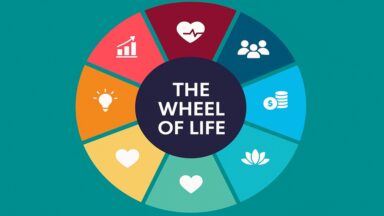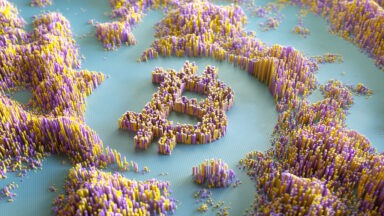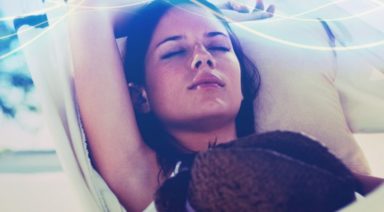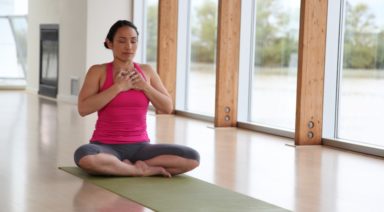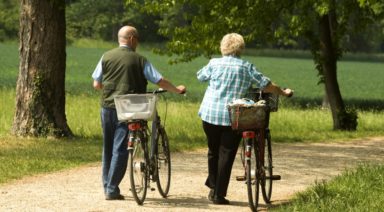Mindfulness Techniques Dramatically Improve Kids’ Sleep in Study

A new study shows that training children in mindfulness techniques can dramatically improve their sleep.
Recent statistics suggest we are in the midst of an epidemic of poor sleep, and children are especially vulnerable to the consequences.
Dr. Christina Chick is a developmental psychologist who recently headed a study at Stanford University that looked at a mindfulness-based solution to sleep issues in children.
“Kids, depending on the age, but between elementary school and junior high, should really be getting nine to 11 hours of sleep per night,” Chick said. “The best data that we have suggests that most kids on average are getting seven hours. So, if you think about that, on average, at least two hours loss night after night after night, that adds up to compound to a significant loss of the restorative functions of sleep.”
Research is continually uncovering the many vital functions that only happen during sleep and are essential for overall health, particularly in children.
“We think of sleep as a passive process, and in fact, it’s a very active one,” Chick said. “So, when your body goes to sleep, your brain in many ways goes to work. Part of that work is consolidating memories, so all of that wonderful learning that happens during the school day, but also social and emotional memory. Sleep is also when a lot of growing happens; if kids are losing out on two hours plus of sleep per night, that starts to add up to a disadvantage over time.”
The consequences of losing sleep in childhood can be dire.
“So, in the short term, emotion regulation suffers, concentration suffers, memory suffers,” Chick said. “In the long-term, we see a host of physical and mental health risks that come from sustained insufficient sleep. Nearly every psychiatric disorder is associated in some way with altered sleep.”
As there is a direct relationship between stress and poor sleep, Chick and her colleagues designed a study that aimed to teach kids skills they could use to help regulate their nervous systems’ response to stress, ideally improving their sleep.
“So, we partnered with a local school district and we delivered a curriculum during the kids’ normal physical education class (PE),” Chick said. “So, twice a week for a period of two years, we taught them a curriculum, that was developed by Pure Edge — there were yoga-inspired movement exercises, (and) there were also breathing exercises.”
Researchers studied participants’ nightly sleep using a method called polysomnography, the findings were overwhelmingly positive.
“We found that the kids in the control group decreased their sleep on average by one hour per night,” Chick said. “In contrast, the kids who received the curriculum actually increased their sleep by an average of over an hour per night, over the two-year period of the study. So, to not only not lose sleep, but gain sleep during this period, was really remarkable. By learning to regulate their nervous system, the kids were putting their bodies into a state that was more conducive to falling asleep, staying asleep, and getting restorative rest.”
Chick is very hopeful that these findings will lead the way for the widespread adoption of such school-based programs. She also urges parents to model and incorporate stress-reduction techniques, such as breathing breaks into their daily lives.
“So, even though we think of yoga, mindfulness, and meditation as adult tools, not only can kids use them, but they can do so effectively and they like it,” she said.
New Tool May Help Solve the Teen Mental Health Crisis

As rates of mental health issues in teens reach epidemic proportions, a new intervention that reframes the way they view stressors shows great promise in improving both psychological and physiological health.
Given the exponentially growing mental health crisis among teens, the American Academy of Pediatrics, along with several other medical organizations, recently declared a national emergency in children’s mental health.
While many societal factors are being implicated, researchers at the University of Rochester recently conducted a study that focused on the ordinary, day-to-day stresses that teens face, such as how they’re perceived by others.
Psychologist Jeremy Jamieson, who headed up the study, told the University of Rochester News Center, “For adolescents, social hierarchy, social comparisons, and peer evaluations have always been important, but now it’s there all the time… people are receiving a daily stream of likes, dislikes, and comments via social media, which makes for a constant state of social evaluation. it’s one of the most damaging things we’ve seen for adolescents.”
While these “social-evaluative stressors” can lead directly to depression and anxiety, it is how teens deal with them, experts say, that determines the psychological outcome.
While conventional thinking equates stress with something “bad,” Jamieson says, “stress is a normal and even defining feature of adolescence… for those of us who study processes and psychophysiology, stress is just any demand for change — it’s neither good nor bad.”







